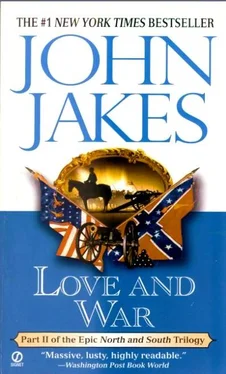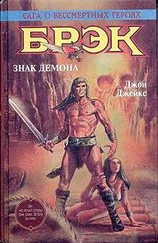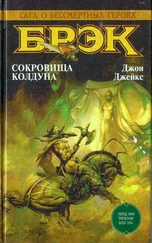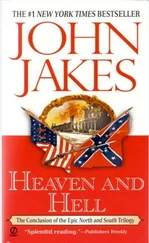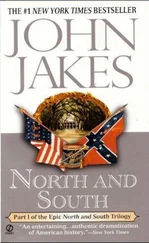He ran to her bedroom, his boots thudding the pegged floor. The bed was neatly made and on the table next to it he spied her book of Pope, a place marked with a pale blue ribbon. Surely she wouldn't leave that if she were planning to be gone for any length of time. She must be away for just a day or two, with the freedmen.
To confirm it, he bore down on the wardrobe, expecting to find most of her clothing. He yanked the doors open.
Empty.
He stood still, frowning, worried. How to explain the contradiction — all the clothes missing and her favorite book left behind?
He had left the porch door open; a strong gust of wind blowing through the hall caught a wardrobe door and hurled it shut with a bang. That roused him and broke the grip of his panic. He carried the book to the kitchen, laid it on the table, then hurried to the barn, where the freedmen stored their tools. All were still in place.
He sawed some boards, nailed them on the inside of the broken window, took the book, and tied the door shut with a length of rope. It would be one of the things for which he would ask her forgiveness the moment he saw her. One of many.
About to mount the mule, he paused and opened the book at the place marked by the ribbon. He discovered a small, unfamiliar flower, its blossom pressed flat, most of the yellow gone. He swallowed.
The poem was "Ode to Solitude." Gus had bracketed four lines with delicate strokes of an inked pen.
Thus let me live, unseen, unknown,
Thus unlamented let me die;
Steal from the world, and not a stone
Tell where I lie.
He cursed and shut the book. A shudder ran down his spine. He booted the mule all the way into Fredericksburg.
Although most of the population had come back, he saw few signs that repair of the destruction had begun. He inquired at two stores, without success. The proprietor of the third, a hefty butcher, gave him some information after he introduced himself.
"She let both her free nigras go. The younger, Boz, passed through town and told me. A few nights later, she disappeared without a word to anybody. That made me recall she had come in the day before and settled her account."
"How long ago was all this?"
"Several months."
"And you haven't seen her since?"
"That's right."
"But where the hell did she go?"
"Who do you think you're talking to, soldier? I'm a Union man." His hand slid across the moist red block to a boning knife. "I were you, I'd be more polite to the people that whipped you, else they might do it again."
Reddening, Charles restrained his anger. "I'm sorry. It's just that I rode a long way to find her."
The butcher saw his opportunity and smirked. "Maybe she didn't want you to find her. Ever think of that? Mrs. Barclay left her place without telling a soul in Fredericksburg or the county where she was headed. You don't believe me, you ask anybody."
He picked up his cleaver and began chopping a slab of faintly shiny meat with hard, swift strokes. Charles walked out, leaving a trail of boot prints in the sawdust. He leaned on the store front, stricken by the truth in the butcher's nastiness.
She hadn't wanted him to come back, else she would have waited. Or at least left word of her destination. Instead, she left a poem about death. The end of everything. He understood the positioning of the ribbon and the inked brackets. They were meant for him.
He walked around the iron hitching post, rested a hand on his worn saddle, and said something broken-sounding under his breath. The mule flicked his ears. Flies landed anyway. The pain, the uncertainty of loss, beat at Charles harder and harder by the second. He didn't try to quell the feelings. He couldn't have done it if he had wanted.
The corporal in charge of the two-man detail hailed from Illinois. He had been educated at Indiana Asbury, a tiny college in the next state, then returned to Danville, the home town of Mr. Lincoln's great companion Ward Latnon, where he taught in a one-room school for two years before mustering for war. He was twenty-four. The private helping him was four years younger. Their detail was one of many assigned to sift through the rubble of Richmond, with shovels and by hand, to locate and retrieve any unburned government documents.
The corporal and the private worked in the skeletal ruins of what had been a warehouse. Part of the roof remained, and two walls. The soldiers started early each day; this morning there was a slight fog, not yet burned off. The sun shafts around the fragment of roof seemed to hold smoke.
"Here's a box hardly touched, Sid," the private said. In this part of the warehouse yesterday they had discovered batches of undelivered letters, most of them at least partly scorched. When they pried open the new box, they found bundles that appeared untouched.
Since their assignment was to recover and mark any mail that could be forwarded, they thought their search, thankless thus far, had finally borne fruit. They were disappointed. The private showed Sid the top letter of a stack he was holding.
"Must've had a heavy rain. Guess the box leaked. Spoilt the address."
The corporal studied the letter. Saw faint handwriting indecipherable because of blots and water streaks.
"The rest like that?"
The private fanned the stack. "Ever' one."
Pleased, Sid said, "Then I guess we should open them. The address might be repeated before the salutation." That was an excuse; he was bored and wanted to sit down awhile. Opening mail beat pawing through wet ashes that stuck to your uniform and made it stink.
Besides, reading the mail of strangers appealed to his sense of drama. He had always loved Othello and Romeo and Juliet and the novels of Dickens. He dreamed of writing a piece of fiction of his own one of these days. Might be some stories worth remembering in these letters.
They sat on fallen beams and opened them one by one. The private did it mechanically, unmoved by anything he read. Sid rapidly grew disgusted. Contrary to his expectations, he found little except bad spelling, worse grammar, and fragmentary, wholly uninteresting observations about homesickness, mother's dearly remembered cooking, or the absolute perfection of every girl to whom a letter was addressed. In twenty minutes he was bored again. But orders were orders.
An hour had passed when he sat up suddenly. "Hold on, here's an interesting one. Signed J. B. Duncan — one of our own officers."
He showed the private the abbreviations and initials following the name. "Brigadier General, United States Volunteers. But it's addressed to someone he calls 'My dear Major Main.' You suppose that's a reb, Chauncey?"
"Pretty likely if the letter's here, don't you think?"
Sid nodded. "Seems to concern some female named Augusta — Oh, my Lord, listen to this. She became pregnant with your child, and although she knew of her condition at the time of your last visit, she would say nothing not wishing to exert moral coercion —" With new enthusiasm, Sid said, "This is an educated man. Telling quite a story."
"Sounds like a hot one," Chauncey observed.
Sid kept reading. " The pregnancy was fully as difficult, not to say dangerous, as that which occurred while she was married to Mr. Barclay. You know the unfortunate outcome that time, I believe. Fearing for her well-being and also her safety on that isolated farm where she foolishly remained throughout much of the worst fighting, I arranged to smuggle my niece over the Potomac and on to my present home in Washington. Here, on December 23 last, she delivered your son, a fine healthy infant to whom she gave the name Charles. But I regret to say the birth —"
The corporal's voice had dropped. He shot the private a melancholy look.
Читать дальше
